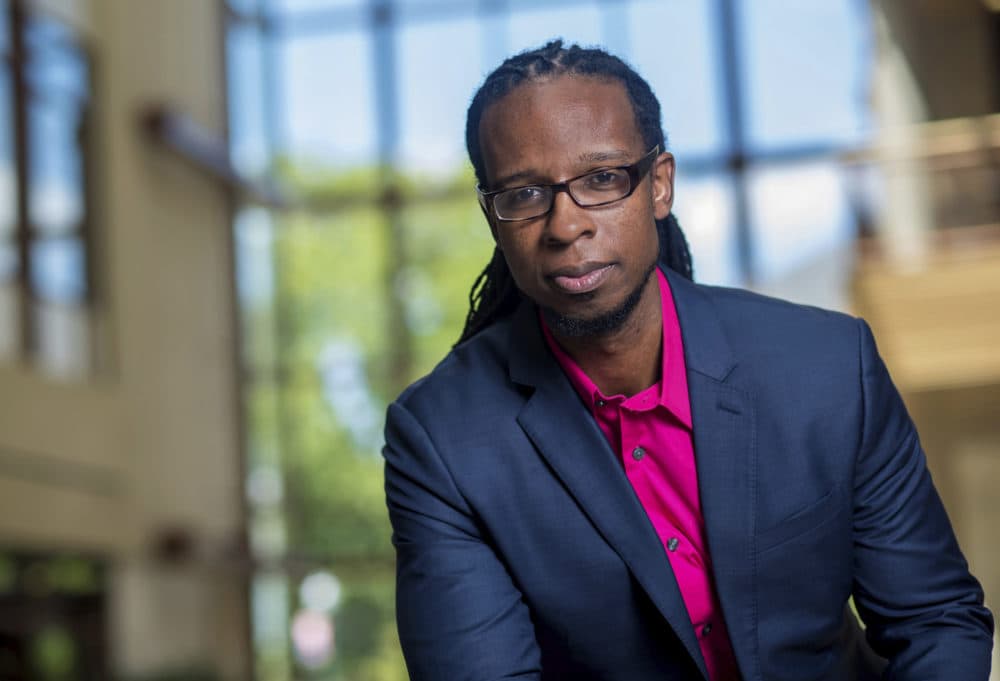Advertisement
Ibram X. Kendi Launches New Center For Antiracist Research At Boston University
Resume
Ibram X. Kendi, one of the nation's leading scholars on racism, has come to Boston to launch Boston University's new Center for Antiracist Research.
While discussions about the center's formation began over a year ago, Kendi's arrival could not be more timely, as the country and Boston enter a third month of protests against racism and police brutality in the wake of George Floyd's death.
Kendi — who also a historian and author of "How To Be An Antiracist"— tells Radio Boston what he hopes the Center can achieve, and how he's reflecting on our nation's current moment.
Interview Highlights
On what it means to be "not racist" versus "anti-racist"
"I think it's critically important for us to realize there are ideas that suggest racial hierarchy — that certain racial groups are better or worse than others — and those are racist ideas. And then there are ideas that suggest racial equality, and those are anti-racist ideas. There are policies that are leading to racial inequity, and those are racist. And there are policies leading to racial equity, and those are anti-racist. As you can see, there's really no place for not racist ideas or race-neutral policies. You know, our views and our policy, they're either being racist to anti-racist, and when we are expressing or supporting or challenging or defending those policies or ideas, that's when we're being racist or anti-racist as well."
"When it comes to anti-racist research... the fundamental research question is, what's wrong with policies? What's wrong with conditions? What's wrong with structures and systems?"
On how data science can be used to study racism — and anti-racism
"Racist research — when there's inequities and injustices — asks the question, well, what's wrong with people? You know, how can we figure out a way to change these people, civilize these people? What's wrong with people? That's the fundamental research question of racist research. When it comes to anti-racist research, and there's inequity and justice, the fundamental research question is, what's wrong with policies? What's wrong with conditions? What's wrong with structures and systems? And so part of the way in which we even see that there is a problem is by having racial data. And racial data, in its collection and its presentation, can either be done in a racist or anti-racist form. And so you have some data scientists who just imagine that data is just removed from human consideration in the way they consider [artificial intelligence] to not have the possibility to be inherently racist or anti-racist because it's made by humans ... and anything made by humans can be racist or anti-racist."
On Boston's history of racism
"When I think of Boston right now, I think of a place that sits at the nexus of some ... of the largest, if not the largest concentration of scholars who are studying racism in the country, if not the world. And so that's what I see.
"You have racial disparities here, and those racial disparities are appalling. And if you have a city with racial disparities, you're going to have racism. But I've never lived in a city that wasn't racist in the United States. And then finally, you know, when I think of Boston, I think of a city that in the 19th century was the beacon of the anti-slavery movement. Why can't we make Boston in the 21st century the beacon of the anti-racist movement?"
"When I think of Boston, I think of a city that in the 19th century was the beacon of the anti-slavery movement. Why can't we make Boston in the 21st century the beacon of the anti-racist movement?"
This article was originally published on July 06, 2020.
This segment aired on July 6, 2020.

